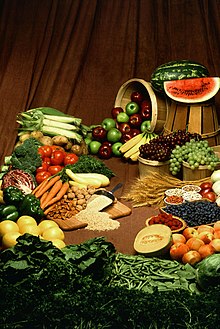Clean eating is a fad diet[1][2] based on the belief that consuming whole foods and avoiding convenience food and other processed foods offers certain health benefits. Variations of the diet may also exclude gluten, grains, and/or dairy products and advocate the consumption of raw food. Extreme versions of the diet have been criticized for lacking scientific evidence and potentially posing health risks.[3][better source needed]

Definition
editThe term "clean eating" originated in the bodybuilding community in the ’90s and meant (and still means there) eating high protein and low carb and avoiding sugar, fat, and junk food to build lean muscle while not adding body fat. Its meaning began to morph in the '00s with a series of popular "Eat-Clean" books by Tosca Reno (the wife of bodybuilding magazine publisher Robert Kennedy).[4] Now, to many, clean eating is the belief that consuming whole foods and avoiding convenience food and other processed foods offers certain health benefits.[5] Variations of the diet may also exclude gluten, grains, and/or dairy products and advocate the consumption of raw food.[6][7][8]
Proponents
editWhile there is limited research on the health effects of clean eating, clean eating trends have become increasingly popular through the use of various media outlets including blogs, television segments, and magazine articles. Many of these media are supported and headed by various health and wellness gurus who typically base the information they provide on personal experience.[9] Advocates include Ella Mills,[10] Natasha Corrett, and the Hemsley sisters.[11]
Criticism
edit"Clean eating" has been used to describe a variety of diets. In the most basic form, the idea of eating more whole foods, fruit and vegetables, and reducing intake of processed, sugary foods like cakes, are broadly agreed on as good changes to one’s diet.[12]
However, some more extreme variants, particularly those cutting out entire food groups, are criticized as lacking scientific evidence for their claims.[3][12] It has also been claimed that a clean eating diet may increase the risk of osteoporosis due to a lack of calcium from dairy products.[3]
See also
editReferences
edit- ^ Tandoh, Ruby (13 December 2016). "Bad fad – Ruby Tandoh on how clean eating turned toxic". Diets and dieting. The Guardian. ISSN 0261-3077. Retrieved 27 July 2017.
- ^ Wilson, Bee (11 August 2017). "Why we fell for clean eating". The Guardian. ISSN 0261-3077. Retrieved 10 March 2019.
- ^ a b c Byrne, Christine (14 March 2019). "Is 'Clean Eating' Good for You? Not Really". Outside. Retrieved 5 November 2019.
- ^ Merritt, Greg. "How Clean Eating Went Mainstream and Sparked a Backlash". The Barbell. Retrieved 27 November 2023.
- ^ Zeratsky, Katherine. "What is clean eating?". Mayo Clinic. Archived from the original on 3 February 2019. Retrieved 9 February 2021.
- ^ Jackson, Marie (12 April 2017). "'Clean eating': How good is it for you?". BBC News. Retrieved 1 July 2017.
- ^ "Clean eating". BBC Good Food. 24 July 2015. Archived from the original on 5 September 2015. Retrieved 1 July 2017.
- ^ Voo, Jocelyn (26 November 2013). "The Complete Crash Course on Clean Eating". Fitness. Retrieved 20 August 2022 – via Yahoo! Life.
- ^ Fivian, E.; Wood, C. (25 June 2019). "The Roles of Social Media, Clean Eating and Self-Esteem in the risk of Disordered Eating: A Pilot Study of Self-reported Healthy Eaters". International Journal of Food, Nutrition and Public Health. 10: 28–39. doi:10.47556/J.IJFNPH.10.1.2018.3.
- ^ "Clean Eating: The Dirty Truth: Is Clean Eating the Best Approach to Better Health?". CBC.ca. Archived from the original on 28 June 2017. Retrieved 1 July 2017.
- ^ Niven, Lisa (17 January 2017). "What is Clean Eating, Anyway?". British Vogue. Retrieved 1 July 2017.
- ^ a b "What is 'clean eating' and should I be doing it?". www.bhf.org.uk. Retrieved 13 August 2023.
External links
edit- Media related to Clean eating at Wikimedia Commons